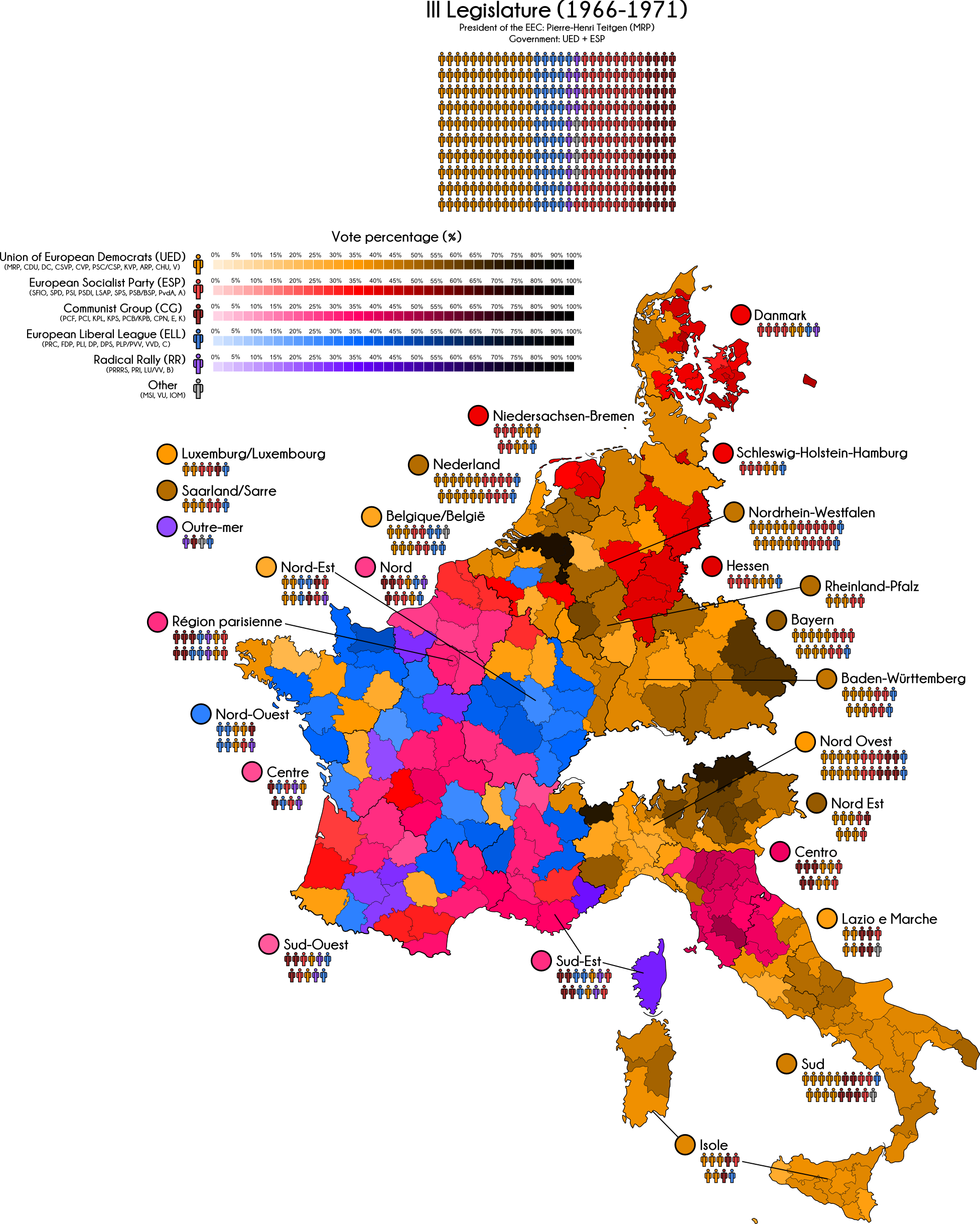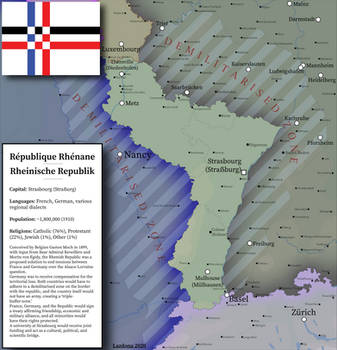ShopDreamUp AI ArtDreamUp
Deviation Actions
Description
The European Community is the (at least in 1966) quasi-federal entity comprising most of continental Europe. Created in 1956 after the ratification of the Treaty of Paris with the creation of the EPC, an umbrella organisation with both economic and political aspects and which also contains the EDC and the ECSC. The EC is still in the making. Although the polity (country?) has its own Armed Forces, the EDF (European Defence Forces) and has progressed quite quickly in political and economic integration, there is a lot to do just yet before the EC becomes something akin to Switzerland. For instance, the Member States still try to fight for their right to operate independently on foreign policy issues, even though they never have control of military or commercial issues, and some aspects of the military, like nuclear weapons proliferation remain beyond its reach (currently an intergovernmental project, F-I-G). The EC has legitimised itself thanks to its status as the second most important NATO member or the exceptional economic growth that Europe is experiencing, not seen since the Belle Époque, and ongoing since the mid-1950s.
Europe really is flourishing, however questions abound how fair it is abound. Social policy is an area that dominates the European political debate, as countries remain rather reticent to share it, given their differences. Whereas France wishes to expand its model of worker's rights protection through the Community, Germany and Italy are reticent, as their cheap workforce is one of their comparative advantages. Germany could accept it in exchange of the process of monetary stabilisation and convergence speeding ahead, but the French are not too keen on that either. But 1966 was a year marked by social conflicts, because in Italy, in France and even in Germany, not to mention Belgium, it's been a year of labour demands and class conflicts, with a high amount of strikes and social conflicts as Saarbruck and the national authorities try to placate these movements by giving in to their demands through further social funding or legislative means.
As it stands, the EC is practically a dominant party system, with the Christian-democratic Union of European Democrats (UED) as the main political party, dominant in every single Member State save France and Denmark. Indeed, the party has been in government at the European level since 1956 and at the national level, it's practically been in government non-stop since WWII. The Union consists of several national federated parties, but the most important ones are the Italian DC and the German CDU-CSU. The politically vague name is the result of a compromise between French and German members, as the former would not accept a clearly confessional name. The current President of the European Executive Council (EEC) is Pierre Henri-Teitgen, a Frenchman, previously a Minister in various French governments and known for his radically pro-European beliefs, sometimes clashing with the national chief executives.
On the right of the spectrum it is possible to find the European Liberal League (ELL), successor of the European Economic League association. It is not so much a proper political party as a group of the various national liberal and conservative parties. The ELL is relatively sceptical of the European integration, mixing federalist rhetoric with a more nationalist outlook, particularly in Germany. The leading party is the French PRC (Parti républicain du centre), led by Roger Duchet, and which happens to be the most pro-European of the lot of them. It is also the most anti-communistic and pro-free market of all the groups, although it makes common cause with some UED elements.
The left is very divided between the European Socialist Party (ESP), strong in Germany and northern Europe, but weak in Italy and France and the Communist Group (CG), strong in Italy and France, weak elsewhere and banned in Western Germany. Although originally sceptical of the whole European integration process, decried by the SFIO as a 'little, Jesuitic Europe', its internationalism, focus on economic and social welfare combined with anti-communism have turned them around. It also helps that amongst the post-war generation of social democrats there are many pro-Europeans (Spaak, Mollet, Saragat, etc.). Indeed, the ESP is currently in a grand coalition arrangement with the UED, backing the EEC.
Needless to say, the Communists, still tied to Moscow are not happy about an organisation that they perceive as radically opposed to Moscow's interests and yet another instrument of capitalist oppression. Well, except for the PCI, but it does not admit it yet, but it's warming up to the internationalism of the EC. Especially given that once you're in, there's no going out.
The Radical Rally (RR) is a bit of an oddity, the last remnants of the non-Marxist left that still exists in Europe. Basically it's a three-party group, although it really is a one party group, given that the French PRS is so much more stronger than any other radical party. Like the Liberals, they are bit sceptical of the European project, but back wholeheartedly its policies of industrial rationalisation, modernisation and concentration. Especially once it became apparent that France would not be bought out by the dynamic German economy - to Mendès-France's satisfaction.
The 1966 election did not constitute a major shift, the same coalition was re-edited (for the last time), in order to further advance in the institution-building process and expand the EC's legitimising base. Teitgen would renew his electoral mandate, although not for much longer; practically ten years in power is a long time. The election was marked by an improvement of the French Christian democrats resulting in the UED ending 19 seats away from an absolute majority. But social troubles are soon to break the pacific picture.
Image size
1953x2439px 999.85 KB
© 2016 - 2024 nanwe01
Comments4
Join the community to add your comment. Already a deviant? Log In
Is the Noordoostpolder supposed to be part of Overijssel?




































